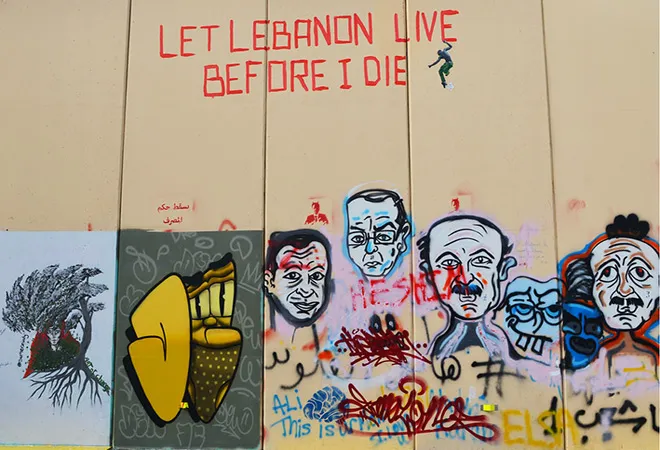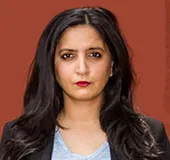
Lebanon’s economy is in free fall as the Lira pegged 1,500 to a US dollar, devalued by 60% over the last three months and is now being traded at 4,000 to a dollar in the black market. The tiny state on the Mediterranean was seen as an oasis of stability and relative well being in an otherwise conflict-ridden West Asia, but no more.
The situation is so dire that the country’s newly nominated Prime Minister, Hassan Diab, wrote an SOS
opinion piece for The Washington Post pleading a global response to combat food insecurity and avoid mass starvation in his country. He acknowledged that the country was witnessing “hunger riots” and that people had stopped buying “meat, fruits and vegetables, and soon may find it difficult to afford even bread.”
Even amidst the COVID-19 lockdown, the Lebanese emerged on the streets of the capital Beirut and thronged market squares in the poorest city Tripoli crying hunger and their inability to feed their families. There is no survey and hence no exact number of how many have lost their jobs and businesses, but the figure is expected to be terribly high if the numbers released by tourism and hospitality sector — which employed 150,000 people, are anything to go by. A press release by the Syndicate of Owners of Restaurants, Nightclubs, Cafes and Patisseries says that 25,000 employees have been fired in the recent months. Talk to anyone on the streets and they say there is little work and men can be spotted loitering around listlessly. Unemployment figures in Lebanon have always been worrying, but it was still acknowledged as a middle-income country. The recent food crisis, however, has made the situation urgent.
Even amidst the COVID-19 lockdown, the Lebanese emerged on the streets of the capital Beirut and thronged market squares in the poorest city Tripoli crying hunger and their inability to feed their families.
Mr Diab urged Russia and Ukraine, from whom Lebanon has been importing 80% of its wheat, to lift export restrictions imposed recently in the light of the pandemic (Russia has become the country with the second highest infections after the United States). He also urged the G20 to come up with an emergency food security fund to help countries like Lebanon and avoid future migration to Europe. “Lebanon’s resources are extremely limited, and a purely domestic answer will not suffice,” the premier said.
Lebanon has been importing wheat — despite its fertile land and plenty of water resources — owing to policies which made importing it cheaper than growing it. Lebanon has failed to feed its people because of a corrupt political elite engaged in a clientelistic approach to governance that benefits loyalists instead of ushering in reforms and economic progress for all their people.
While the coronavirus lockdown has certainly exacerbated the economic collapse and the protests that engulfed the country in October caused panic, the disaster was long in the making.
The civil society, which was thus far focused on the 1.5 million Syrian and over 50,000 Palestinian refugees, has turned its attention to the impoverished Lebanese.
It started with the end of the civil war in 1990. Lebanon had to resurrect itself from ashes after the 15-year-long bloody quarrel between myriad groups finally ended. It did not have a flourishing manufacturing industry and exported next to nothing. Instead, it depended on cash inflows from the diaspora that had fled the civil war for safer shores. In 1997, the central bank of Lebanon fixed the exchange rate and pegged it to the dollar. It succeeded in luring the Lebanese abroad to invest back home as they could withdraw the money at the dollar rate if they wanted. To keep it going the central bank offered high interest rate to depositors but that was deemed unsustainable and described as a Ponzi scheme. Eventually, since there was no real money in the system, the depositors started to pull back. Last year, the banks reacted with controls on capital withdrawal and transfers that ended up punishing average Lebanese. The people are now struggling to withdraw their hard-earned cash and at a time the prices of even basic commodities have quadrupled.
The civil society, which was thus far focused on the 1.5 million Syrian and over 50,000 Palestinian refugees, has turned its attention to the impoverished Lebanese. The poorer segments of the country are relying on charity organisations for whatever they can get their hands on. Most of the donations are coming from Lebanese expats but far from what is needed to keep everyone fed, educated and healthy.
After months of back and forth between political parties over whether or not to seek a bail out from the International Monetary Fund
, since the old ruling elite worried about the IMF demanding political reforms that may further weaken their grip on the country — the government has finally concluded that there is no other way. They have asked the IMF for a $9 billion rescue package and also entreated European nations to release an $11 billion fund promised back in 2018. But Europe held back for the same reason the IMF is reticent now — lack of trust in Lebanon’s politicians that they will actually initiate meaningful reforms and austerity.
Hassan Diab’s government has found no answers to the demands of the protestors, however, his finance minister, Ghazi Wazni, has assured the IMF that the Lira would be floated — but in time.
Lebanon’s protestors are also skeptical of a deal that may further increase their burden if it asks the government to reduce subsidy on fuel, wheat and electricity. They insist that before support from outside the corrupt politicians should hand over money they stole from the public.
Hassan Diab’s government has found no answers to the demands of the protestors, however, his finance minister, Ghazi Wazni, has assured the IMF that the Lira would be floated — but in time. He said: “We need to change the stabilisation policy to one of a flexible exchange rate in a first stage and for the foreseeable future,” but added, “when we receive financial support from abroad, we will transition to flotation.”
It is hard to say if and when the IMF and European money would come in and on what conditions. The road to recovery would surely be a long one. For now, the Lebanese Lira is falling and so are the living standards of the Lebanese people.
The views expressed above belong to the author(s). ORF research and analyses now available on Telegram! Click here to access our curated content — blogs, longforms and interviews.



 Lebanon’s economy is in free fall as the Lira pegged 1,500 to a US dollar, devalued by 60% over the last three months and is now being traded at 4,000 to a dollar in the black market. The tiny state on the Mediterranean was seen as an oasis of stability and relative well being in an otherwise conflict-ridden West Asia, but no more.
The situation is so dire that the country’s newly nominated Prime Minister, Hassan Diab, wrote an SOS
Lebanon’s economy is in free fall as the Lira pegged 1,500 to a US dollar, devalued by 60% over the last three months and is now being traded at 4,000 to a dollar in the black market. The tiny state on the Mediterranean was seen as an oasis of stability and relative well being in an otherwise conflict-ridden West Asia, but no more.
The situation is so dire that the country’s newly nominated Prime Minister, Hassan Diab, wrote an SOS  PREV
PREV


